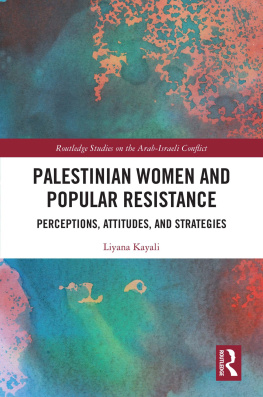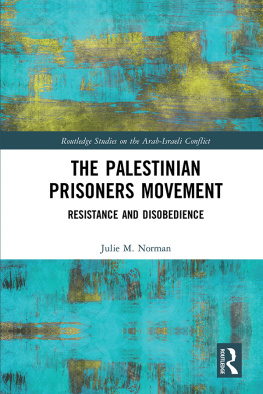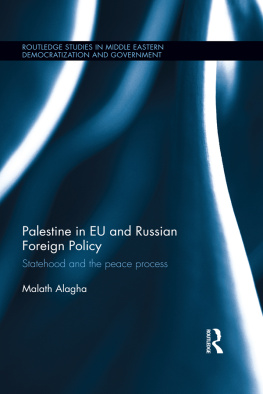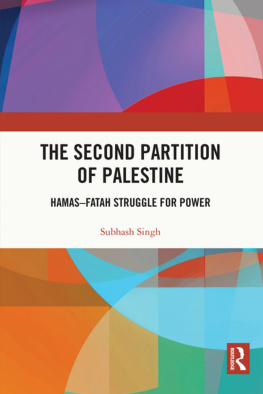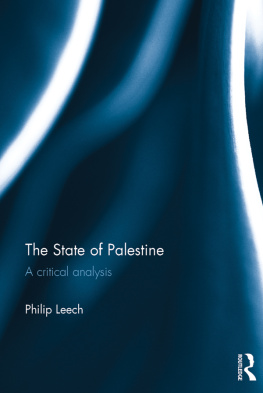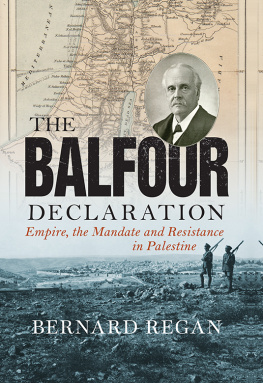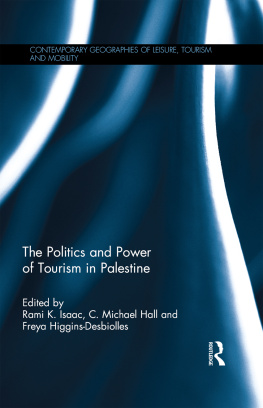The PFLP's Changing Role in the Middle East
To my wife Sima, with love and gratitude
THE PFLP'S CHANGING ROLE IN THE MIDDLE EAST
HAROLD M. CUBERT, Ph.D.
First Published in 1997
FRANK CASS & CO. LTD.
Published 2013 by Routledge
2 Park Square, Milton Park, Abingdon, Oxon OX14 4RN
711 Third Avenue, New York, NY 10017, USA
Routledge is an imprint of the Taylor & Francis Group, an informa business
Copyright 1997 Frank Cass & Co. Ltd.
All rights reserved. No part of this book may be reprinted or reproduced or utilised in any form or by any electronic, mechanical, or other means, now known or hereafter invented, including photocopying and recording, or in any information storage or retrieval system, without permission in writing from the publishers.
British Library Cataloguing in Publication Data
Cubert, Harold M.
The PFLP's changing role in the Middle East
1. PFLP 2. Fath (Organisation) 3. Popular fronts - Middle East
4. Middle East - Politics and government -1979
I. Title
322.420956
Library of Congress Cataloging-in-Publication Data
Cubert, Harold M.
The PLFP's changing role in the Middle East/Harold M. Cubert.
p. cm.
Includes bibliographical references and index.
ISBN 978-0-714-64329-8 (pbk)
1. Jabha al-Shabiyah li-Tahir Filastin. 2. IsraelArab conflicts. 3. National liberation movements--Palestine. I. Title.
| 324.2569408--dc20 | 96-42486
CIP |
Contents
The author gratefully acknowledges the following individuals whose assistance and encouragement made this book possible: Professor Paul Wilkinson, Head of the School of History and International Relations at the University of St Andrews, whose patience, knowledge, and experience were invaluable in helping to transform an idea into a publishable Ph.D. thesis; Dr Bruce Hoffman, Chairman of the Department of International Relations at the University of St Andrews and Dr Richard Clutterbuck, of the University of Exeter, for their candid comments and criticisms as members of the thesis examination committee; Mr Robert Easton, Managing Editor at Frank Cass Publishers, whose patience and optimistic demeanour painlessly guided a neophyte author through an unfamiliar process; and finally, my valued colleague Mr Michael Lindemann, who drew my attention to the PFLP as an organization worthy of study and supported my efforts throughout the project.
HMC
The Popular Front for the Liberation of Palestine (PFLP) represents a violent Marxist trend among Palestinian political organizations. It is uncompromisingly hostile toward Israel, the industrialized West, and the West's regional allies, and it rejects any settlement of the Arab-Israeli conflict which does not entail both Israel's elimination and the establishment of an independent Palestinian state on all the land that the PFLP claims to be Palestine. The PFLP remains committed to armed conflict with its enemies until this occurs.
This book attempts to explain the PFLP's lagging position within the secular Palestinian national movement by comparing its policies with those of Fatah. Unlike the PFLFJ Fatah's overriding concern was to establish a Palestinian authority on any portion of liberated land; the question of Israel's existence would be considered later. Fatah's supporters were never selected for their ideological compatibility. The organization formed coalitions with all interested parties and accepted assistance from all willing providers. Most importantly, Fatah - as the dominant faction within the PLO transformed itself from an underground group to a quasi-government with diplomatic status, and it later achieved the leadership of the Palestinian National Authority (PNA) in the West Bank and Gaza Strip.
Fatah's flexibility enabled it to survive regional and global changes. In the unipolar international order which followed the Soviet bloc's collapse in 1991, the PLO courted the United States and its allies, participated in the Arab-Israeli peace process, and was rewarded with authority over part of the Palestinian homeland. The PFLP, spurning change, refused to act likewise. With its headquarters in Damascus, it can do nothing at the moment without the Syrian government's approval and Syria, on the verge of a peace agreement with Israel, is unlikely to allow its protg to do more than issue statements. Only an imaginative and bold move by the PFLP, at this point, can restore the organization's prestige among its constituents and notoriety among its enemies.
Introduction:
Overview of the PFLP's ideology and aims
Although the priorities of the Popular Front for the Liberation of Palestine (PFLP), and its predecessor, the Arab Nationalists Movement (ANM), have shifted with every major international and Middle Eastern political realignment, its fundamental aim of eliminating Israel and replacing it with a Palestinian state has remained constant throughout its history. What has changed over time is the focus of its activities, the alliances that it has formed with other organizations and governments, and the time limits which it has set for achieving its aims.
The PFLP is a secular nationalist organization which seeks to set up a Palestinian state on territory which is currently under Israel's sovereignty or administrative control. This territory, which was governed under a British mandate between 1917 and 1948, should in the PFLPs view have been turned over to a Palestinian Arab government in 1948, but was instead unjustly transferred to Zionist control. This eventually resulted in the establishment of the state of Israel and the dispersal of most of the territory's Arab inhabitants to the neighbouring countries and beyond. The PFLP seeks to restore what it considers to be stolen territory to Palestinian sovereignty, to dismantle the state of Israel, to bring about the return of the Palestinian diaspora to its homeland, and to establish a secular democratic state in Israel's place.
This is the PFLP's core aim and Israel is its principal adversary. However, the PFLP has also identified its ancillary foes; that is to say, countries which it believes facilitated the establishment of Israel and continue to ensure the Jewish state's survival of the Jewish state through military and economic aid. The United States is the chief target in this category, primarily because of what the PFLP views as its unconditional support for Israel and the vast amounts of American military and economic aid that Israel receives annually.
Other countries in the same category as the United States, but guilty to a lesser degree, include Britain and other western European nations such as France and Germany, all of which the PFLP blames for having provided the Zionist movement - and later Israel with political, military, or economic support. For example, the PFLP holds Britain responsible for having legitimized the Zionist presence in Palestine in the 1917 Balfour Declaration. This document implied, among other things, British support for the eventual establishment there of a Jewish state. The PFLP blames both Britain and France for having supplied Israel with sophisticated weaponry from the early 1950s until the Six Day War of 1967, and vilifies Britain, France, and Germany for their current close economic links with Israel.
The PFLP explains Israel's close links with the United States and western Europe by viewing Israel as a proxy through which those countries protect their economic and political interests in the region from Arab nationalist movements. It regards Israel as a source of intelligence on these political movements for the United States and its allies; a surrogate military force which can attack or threaten anti-Western countries or organizations, and a potential launching pad for direct military intervention.



